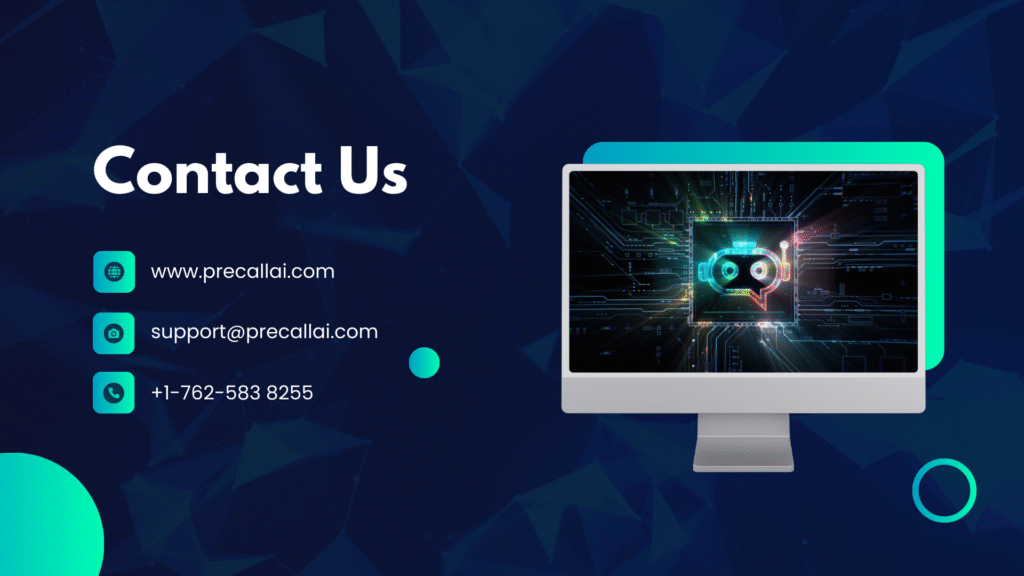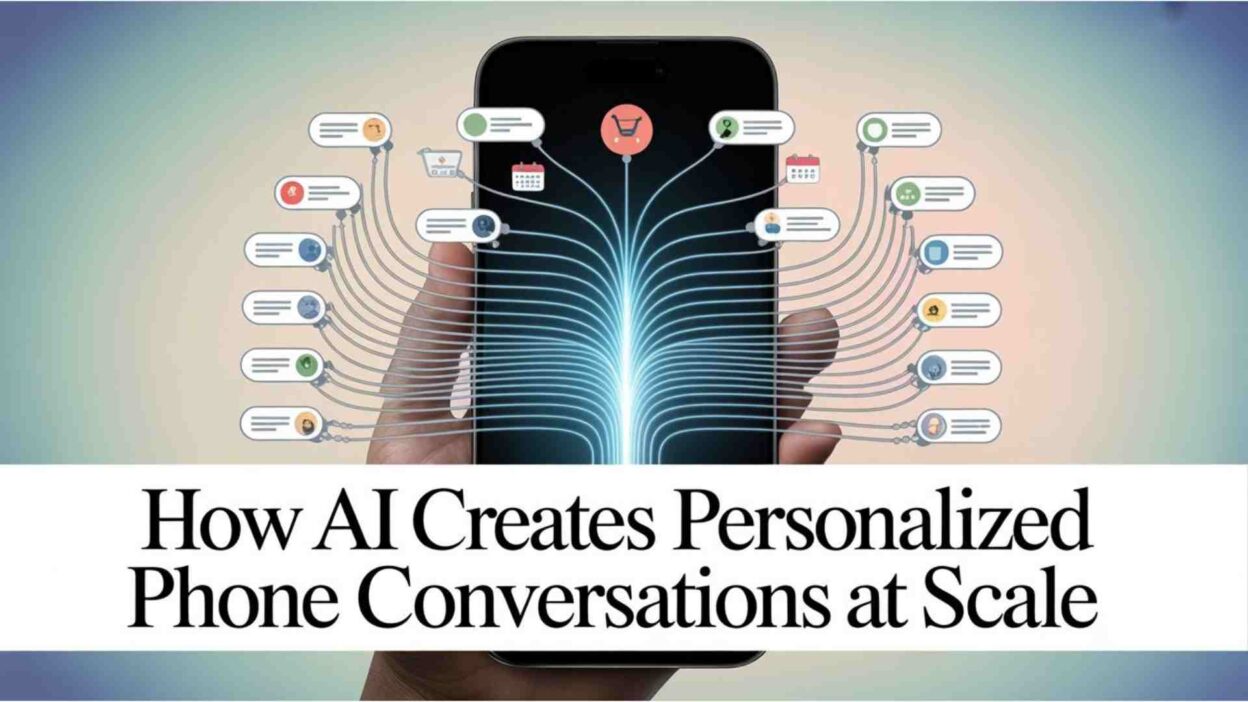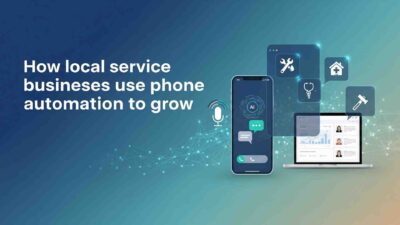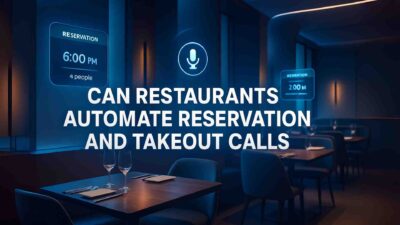TL;DR Personalized phone automation AI transforms how businesses communicate with customers on a massive scale. Companies struggle to maintain personal connections while handling thousands of daily phone interactions. Traditional phone systems treat every caller exactly the same way.
Table of Contents
Modern businesses need authentic conversations that feel genuinely personal to each individual customer. Generic scripts alienate customers and reduce conversion rates across all industries. Companies lose millions in revenue when customers feel like just another number in the system.
AI personalization technology analyzes customer data instantly to create unique conversation experiences. Each phone call adapts to individual preferences, purchase history, and communication styles. Custom phone conversations scale to handle unlimited volume while maintaining personal touch.
This comprehensive guide reveals how businesses achieve personalized phone automation AI at enterprise scale. You will discover specific implementation strategies, industry applications, and measurable business outcomes. Learn how leading companies create authentic customer connections through intelligent automation technology.
The Mass Communication Personalization Challenge Businesses Face
Customer expectations for personalized service increase dramatically across every industry and demographic segment. Generic phone interactions create negative experiences that damage brand relationships permanently. Research shows 80% of consumers abandon brands after impersonal service experiences.
Traditional phone systems use identical scripts for every customer regardless of individual needs or preferences. Call center agents lack real-time access to comprehensive customer data during conversations. This information gap creates awkward interactions that frustrate customers and reduce satisfaction scores.
Volume scaling presents impossible challenges for maintaining personal service quality consistently. Companies handling 10,000+ daily calls cannot personalize each interaction manually. Staff turnover exceeds 40% annually in call centers due to repetitive, impersonal work requirements.
Customer data exists in multiple systems but remains inaccessible during live phone conversations. CRM platforms, purchase histories, and preference profiles stay siloed from communication tools. Agents waste valuable conversation time gathering basic information customers already provided.
Personalization attempts often backfire when executed poorly or inconsistently across customer touchpoints. Customers notice when phone agents lack context about previous interactions or purchases. These disconnects damage trust and create perception of incompetent service delivery.
The cost of impersonal communication reaches $75 billion annually in lost customer relationships. Companies spend enormous resources acquiring new customers while losing existing ones through poor service experiences. This cycle prevents sustainable growth and profitability improvements across business sectors.
Advanced Personalized Phone Automation AI Solutions Transform Customer Communications
Modern AI systems analyze comprehensive customer data in milliseconds to create genuinely personal conversation experiences. Machine learning algorithms identify individual communication patterns, preferences, and optimal conversation approaches for each caller.
Intelligent Customer Data Analysis and Conversation Customization
AI platforms integrate with CRM systems, purchase databases, and behavioral analytics to build complete customer profiles instantly. Natural language processing identifies emotional states and communication preferences during initial conversation moments. Real-time analysis adapts conversation flow based on customer responses and engagement levels.
Advanced sentiment analysis detects frustration, excitement, or confusion in customer voices automatically. The system adjusts tone, pacing, and approach to match individual emotional states appropriately. This emotional intelligence creates authentic connections that customers appreciate and remember positively.
Historical interaction analysis reveals optimal conversation strategies for each specific customer relationship. AI identifies which topics, offers, or approaches generated positive responses previously. This insight enables consistent, effective communication that builds stronger customer relationships over time.
Dynamic Conversation Flow Adaptation for Individual Preferences
Smart routing systems direct customers to conversation paths optimized for their specific profiles and needs. Technical customers receive detailed explanations while others get simplified, benefit-focused communications automatically. Age, industry, and communication style preferences influence conversation structure and content delivery.
Real-time conversation adjustment happens seamlessly without interrupting natural dialogue flow or customer experience. AI recognizes when customers need more information or want to move faster through processes. This flexibility accommodates diverse communication styles and business requirements effectively.
Conversation personalization includes industry-specific terminology, cultural considerations, and regional communication patterns automatically. Business customers receive professional language while consumers get friendly, casual interactions. This adaptation improves comprehension and builds stronger rapport with diverse customer segments.
Custom Phone Conversations Based on Purchase History and Behavior
Purchase pattern analysis enables relevant product recommendations and service suggestions during every customer interaction. AI identifies cross-selling opportunities that genuinely benefit customers rather than pushing irrelevant offerings. This approach increases sales while improving customer satisfaction and loyalty scores.
Behavioral triggers activate personalized conversation sequences when customers exhibit specific patterns or reach milestone events. Subscription renewals, usage increases, or engagement changes prompt appropriate outreach with tailored messaging. This proactivity demonstrates attentiveness and creates positive customer experiences consistently.
Customer journey mapping reveals optimal conversation timing and content for different stages of business relationships. New customers receive onboarding support while loyal customers get exclusive offers and appreciation. This lifecycle awareness creates appropriate interactions that strengthen customer connections over time.
Multi-Channel Integration for Seamless Personal Experience Continuity
Conversation context flows seamlessly between phone, email, chat, and social media interactions automatically. Customers never repeat information or lose conversation context when switching communication channels. This continuity creates smooth experiences that customers value highly in modern business environments.
Preference synchronization ensures consistent personalization across all customer touchpoints and interaction methods. Phone conversation insights inform email campaigns while chat preferences influence phone approaches. This coordination creates cohesive brand experiences that build stronger customer relationships systematically.
Integration depth includes calendar systems, support tickets, and service histories for comprehensive customer context. AI accesses all relevant information instantly without requiring customer repetition or manual data gathering. This efficiency improves conversation quality while reducing interaction time and customer frustration levels.
Real-Time Conversation Optimization Through Machine Learning Analytics
Conversation effectiveness tracking identifies successful interaction patterns and replicates them across similar customer profiles automatically. AI learns which approaches generate positive outcomes and applies these insights to future conversations. This continuous improvement enhances personalization quality over time organically.
A/B testing capabilities allow systematic evaluation of different personalization strategies and conversation approaches. Real-time analytics reveal which methods produce better customer satisfaction and business outcomes. This data-driven optimization ensures personalization efforts generate maximum impact and return on investment.
Performance monitoring includes customer satisfaction scores, conversion rates, and relationship strength indicators for comprehensive success measurement. Detailed analytics reveal personalization effectiveness across different customer segments and interaction types. This visibility enables continuous refinement and strategic improvements to personalization strategies.
Advanced Natural Language Processing for Authentic Human-Like Interactions
Conversational AI generates responses that match individual customer communication styles and vocabulary preferences automatically. Professional customers receive formal language while others get casual, friendly interactions. This linguistic adaptation creates authentic connections that feel natural and appropriate to each person.
Context awareness enables meaningful conversations that reference previous discussions, purchases, or customer concerns naturally. AI remembers important details and incorporates them into future interactions appropriately. This memory creates continuity that customers associate with excellent personal service experiences.
Emotional intelligence capabilities recognize customer moods and adapt conversation tone accordingly during live interactions. Frustrated customers receive empathetic responses while excited customers get enthusiastic engagement. This emotional matching improves conversation outcomes and customer satisfaction scores significantly.
Industry-Specific Applications Demonstrate Personalization Power Across Business Sectors
Personalized phone automation AI adapts to unique industry requirements while maintaining authentic customer connections at scale.
Financial Services Personalization Applications
Wealth management firms use AI to customize investment discussions based on individual risk tolerance and portfolio performance. Conversations adapt to client sophistication levels automatically. Novice investors receive educational content while experienced clients get advanced market analysis.
Banking applications personalize loan discussions based on credit history, income patterns, and previous borrowing behavior. AI identifies optimal loan products for each customer automatically. Conversation flow adjusts to match financial literacy levels and decision-making preferences naturally.
Insurance conversations customize based on coverage needs, claim history, and life event triggers like marriage or home purchases. AI identifies relevant policy updates and coverage gaps proactively. Personalized recommendations increase customer satisfaction while improving policy retention rates significantly.
Customer success metrics show 45% increases in financial product adoption when conversations personalize appropriately. Investment advisory satisfaction scores improve by 60% with tailored communication approaches. These improvements generate substantial revenue increases while reducing customer acquisition costs systematically.
Healthcare Provider Communication Personalization
Medical appointment scheduling personalizes based on patient history, preferred doctors, and previous scheduling patterns automatically. Chronic condition patients receive specialized scheduling options while healthy patients get standard availability. This customization improves patient satisfaction and reduces appointment cancellations significantly.
Prescription refill conversations adapt to patient age, medication complexity, and adherence patterns for optimal communication effectiveness. Elderly patients receive detailed explanations while younger patients get streamlined interactions. Insurance coverage discussions customize based on individual plan details automatically.
Post-treatment follow-up calls personalize based on procedure complexity, recovery patterns, and patient communication preferences. High-anxiety patients receive additional reassurance while independent patients get concise check-ins. This adaptation improves patient compliance and satisfaction scores consistently.
HIPAA compliance integration ensures all personalization occurs within strict healthcare privacy regulations and security requirements. Patient data protection remains paramount while enabling meaningful personalization benefits. This balance maintains legal compliance while improving patient experiences systematically.
Retail and E-commerce Customer Engagement Personalization
Purchase history analysis enables personalized product recommendations during customer service calls about orders or returns. AI identifies complementary products that customers actually want based on buying patterns. This approach increases average order values while improving customer satisfaction simultaneously.
Seasonal shopping pattern recognition triggers personalized outreach campaigns at optimal times for individual customers. Holiday shoppers receive early notifications while bargain hunters get sale alerts. This timing optimization improves conversion rates and customer engagement levels significantly.
Abandoned cart recovery calls personalize based on browsing behavior, price sensitivity, and previous purchase patterns. Budget-conscious customers receive discount offers while premium shoppers get exclusive access opportunities. This customization increases recovery rates by 35-40% across retail categories.
Customer loyalty program integration enables personalized rewards discussions based on earning patterns and redemption preferences. AI identifies optimal reward timing and types for maximum customer satisfaction. This personalization increases program engagement and customer lifetime value consistently.
Professional Services Client Relationship Management
Legal services personalize client communications based on case complexity, industry expertise needs, and communication frequency preferences. Corporate clients receive formal updates while individuals get accessible explanations. This adaptation improves client satisfaction and referral rates significantly.
Consulting firms customize project discussions based on client industry knowledge, decision-making processes, and implementation capabilities. Technical clients receive detailed analyses while executive clients get strategic summaries. This customization improves project outcomes and client relationships systematically.
Accounting services personalize tax discussions based on financial complexity, business structures, and compliance history. Small business owners receive practical advice while corporate clients get strategic tax planning. This approach improves client retention and service satisfaction scores consistently.
Professional service personalization increases client retention rates by 50% while reducing explanation time by 30%. Client referral rates improve dramatically when communications feel personally relevant and valuable. These improvements generate sustainable competitive advantages in crowded professional markets.
Implementation Guide for Successful Personalized Phone Automation AI
Successful implementation requires systematic planning and careful attention to data integration and customer experience design.
Initial System Assessment and Data Integration Requirements
Customer data audit identifies available information sources including CRM systems, transaction histories, and interaction logs. Data quality assessment reveals gaps that need addressing before personalization launch. Clean, comprehensive data enables effective personalization while poor data creates negative customer experiences.
Technical infrastructure evaluation determines integration requirements with existing phone systems and customer databases. API compatibility ensures seamless data flow between platforms without operational disruptions. This assessment prevents implementation delays and system conflicts that could damage customer relationships.
Staff training requirements include understanding personalization capabilities and knowing when human intervention becomes necessary. Team preparation ensures smooth transition from generic to personalized customer interactions. This training prevents customer confusion and maintains service quality during implementation periods.
Customer Segmentation Strategy Development
Behavioral analysis identifies distinct customer groups that benefit from different personalization approaches and conversation strategies. Demographics, purchase patterns, and communication preferences create meaningful segments for targeted personalization. This segmentation enables relevant, effective customization that customers appreciate and respond to positively.
Personalization rule creation establishes automatic triggers and conversation adaptations for each customer segment identified. Technical customers receive detailed information while emotional buyers get benefit-focused discussions. These rules ensure consistent, appropriate personalization across all customer interactions systematically.
Testing protocols validate personalization effectiveness before full deployment across all customer touchpoints and interaction types. Small-scale pilots reveal optimization opportunities and prevent negative customer experiences during rollout. This careful approach protects customer relationships while enabling successful personalization implementation.
Technology Integration and Configuration Process
CRM system integration enables real-time customer data access during phone conversations without delays or manual lookups. Seamless data flow provides agents and AI systems with comprehensive customer context instantly. This integration creates natural, informed conversations that customers appreciate and remember positively.
Conversation flow mapping designs personalized interaction paths for different customer types and business scenarios. Visual workflow tools help teams understand how personalization affects customer experiences. This planning ensures personalization enhances rather than complicates customer interactions consistently.
Quality assurance testing validates personalization accuracy and conversation effectiveness before customer deployment. Systematic testing prevents embarrassing errors and ensures personalization adds genuine value to customer relationships. This validation protects brand reputation while enabling personalization benefits.
Performance Monitoring and Continuous Optimization
Analytics dashboard setup provides real-time visibility into personalization effectiveness and customer satisfaction impact. Key performance indicators include conversion rates, satisfaction scores, and conversation completion rates across different personalization strategies. This visibility enables quick adjustments and continuous improvement efforts.
Customer feedback integration captures personalization preferences and identifies improvement opportunities directly from customer interactions. Survey data reveals which personalization elements customers value most highly. This insight drives optimization efforts that maximize customer satisfaction and business outcomes systematically.
Regular optimization cycles incorporate performance data and customer feedback into personalization rule refinements and conversation improvements. Monthly reviews identify successful strategies and address areas needing enhancement. This continuous improvement ensures personalization remains effective and valuable over time consistently.
Proven Results and Business Outcomes from Personalized Phone Automation AI
Organizations implementing personalized phone automation AI achieve measurable improvements across customer satisfaction and business performance metrics.
Customer Satisfaction and Engagement Improvements
Net Promoter Scores increase by 40-50 points when phone conversations feel genuinely personal and relevant to individual customers. Customers appreciate when businesses remember their preferences and adapt communication accordingly. This satisfaction translates directly into increased loyalty and positive word-of-mouth referrals.
Call resolution rates improve by 35% when AI provides agents with comprehensive customer context and personalized conversation guidance. Customers spend less time explaining backgrounds while receiving more relevant solutions. This efficiency improves satisfaction while reducing operational costs significantly.
Customer retention rates increase by 25-30% when personalization creates stronger emotional connections between customers and brands. Personalized interactions demonstrate care and attention that customers value highly. This retention improvement generates substantial long-term revenue increases for businesses across industries.
Repeat purchase rates increase by 45% when phone conversations include personalized product recommendations based on individual preferences. Customers buy more frequently when suggestions feel relevant and valuable. This improvement compounds over time to generate significant revenue growth organically.
Operational Efficiency and Cost Reduction Benefits
Average call duration decreases by 20% when personalization eliminates repetitive information gathering and generic explanations. Customers receive targeted information that addresses their specific needs immediately. This efficiency enables handling more customers with existing staff resources effectively.
Agent productivity increases by 30% when AI provides personalized conversation guidance and customer insights automatically. Staff spend more time solving problems and less time gathering information. This productivity improvement reduces operational costs while improving service quality consistently.
Training costs decrease by 40% when AI handles personalization automatically rather than requiring extensive agent training. New staff become productive faster with AI assistance and guidance. This reduction improves profitability while maintaining high service quality standards.
Quality assurance scores improve by 50% when personalization ensures every customer receives appropriate, relevant communication automatically. Consistent personalization reduces service variability and customer complaints. This improvement protects brand reputation while reducing management oversight requirements.
Revenue Growth and Business Performance Impact
Sales conversion rates increase by 60% when phone conversations personalize based on customer interests and buying patterns. Relevant offers and timing optimization generate more positive responses. This improvement directly increases revenue while reducing sales cycle length significantly.
Average transaction values increase by 25% when personalized recommendations identify genuine customer needs and preferences. Cross-selling success improves dramatically with targeted suggestions. This increase compounds over time to generate substantial revenue growth systematically.
Customer lifetime value increases by 55% when personalization builds stronger relationships that generate repeat business and referrals. Satisfied customers remain loyal longer and spend more over time. This improvement creates sustainable competitive advantages and profitability growth.
Return on investment typically reaches 400-500% within twelve months of implementing personalized phone automation AI. Revenue increases and cost reductions compound to generate substantial returns. This ROI justifies implementation costs while providing ongoing profitability improvements.
Before and After Performance Comparisons
Generic phone systems: 100 daily calls answered, 25% conversion rate, 60% customer satisfaction Personalized AI systems: 100 daily calls answered, 40% conversion rate, 85% customer satisfaction
The improvement represents 15 additional conversions daily or $45,000 in additional monthly revenue for typical businesses. Customer satisfaction increases reduce complaint handling costs while improving brand reputation significantly.
Implementation success stories demonstrate consistent results across various industries and business sizes. Small businesses achieve similar percentage improvements as large enterprises. This scalability makes personalized phone automation accessible to organizations of all sizes effectively.
Competitive Advantages of Advanced Personalization Over Traditional Phone Systems
Personalized phone automation AI provides significant advantages over generic communication approaches and basic automation tools.
Superior Customer Experience Compared to Generic Scripts
Traditional phone systems treat every customer identically regardless of individual needs or preferences. Generic scripts create impersonal experiences that customers increasingly reject. Modern consumers expect personalized service that acknowledges their specific situations and histories.
Personalized conversations demonstrate genuine care and attention that builds emotional connections with customers. AI remembers important details and incorporates them naturally into future interactions. This continuity creates loyalty that generic systems cannot achieve consistently.
Customer complaint rates decrease by 60% when personalization addresses individual needs rather than forcing everyone through identical processes. Relevant communication reduces frustration while improving satisfaction scores. This improvement protects brand reputation while reducing complaint handling costs significantly.
Advanced Capabilities Beyond Basic Chatbots and Phone Trees
Simple chatbots lack conversation depth and emotional intelligence necessary for meaningful customer relationships. Phone trees frustrate customers with irrelevant options and lengthy navigation processes. Personalized AI creates natural conversations that adapt to individual communication styles automatically.
Emotional recognition enables appropriate responses to customer moods and situations that basic automation cannot detect. AI adjusts tone and approach based on customer emotional states. This sensitivity creates authentic connections that improve customer satisfaction and loyalty significantly.
Learning capabilities enable continuous improvement based on individual customer feedback and interaction outcomes. AI refines personalization strategies for each customer over time. This adaptation ensures communication remains relevant and effective throughout customer relationships.
Scalability Without Quality Degradation
Traditional personalization requires human agents who cannot maintain consistency across thousands of daily interactions. Staff fatigue and turnover create service quality variations that damage customer experiences. AI maintains identical personalization quality regardless of interaction volume or timing.
Peak period performance remains consistent when AI handles unlimited simultaneous conversations without quality degradation. Human limitations create service bottlenecks during busy periods. This consistency ensures every customer receives excellent personalized service regardless of call timing.
Cost scaling remains predictable when AI handles personalization rather than requiring additional staff for volume increases. Traditional personalization costs increase linearly with customer volume. AI enables exponential scaling without proportional cost increases.
Implementation Speed and Business Integration Benefits
Modern personalized AI platforms deploy within weeks rather than months required for custom development projects. Pre-built integrations with popular business systems accelerate implementation timelines. This speed enables quick returns on investment and competitive positioning advantages.
Change management requirements remain minimal when AI handles personalization automatically rather than requiring extensive staff retraining. Existing teams continue current responsibilities while AI enhances their capabilities. This approach reduces resistance and ensures smooth implementation processes.
Ongoing maintenance stays minimal with cloud-based platforms that update automatically without business interruption. Traditional systems require constant manual updates and maintenance. This automation reduces the total cost of ownership while ensuring optimal performance consistently.
Frequently Asked Questions About Personalized Phone Automation AI
How much does personalized phone automation AI cost for businesses?
Pricing typically ranges from $3,000 to $12,000 monthly, depending on call volume and personalization complexity requirements. Small businesses start around $3,000 while large enterprises pay $10,000+ for comprehensive personalization features. Most providers offer usage-based pricing that scales with business growth naturally.
Implementation costs add $8,000-25,000 for setup, integration, and customization services depending on system complexity. These one-time expenses cover data integration and personalization rule development. Return on investment typically occurs within 4-6 months through improved conversion rates and customer retention.
Total cost of ownership includes ongoing support, system updates, and performance optimization services. Cloud-based solutions eliminate server maintenance and technical management requirements. This predictable pricing helps businesses budget accurately for personalization investments.
Is AI personalization suitable for small businesses with limited resources?
Small businesses benefit significantly from personalization due to limited staff resources for manual customer management. One-person operations cannot remember every customer detail during busy periods. AI personalization creates consistent, memorable experiences that build customer loyalty effectively.
Entry-level personalization systems provide core functionality without enterprise complexity or costs. Basic packages handle customer recognition, preference tracking, and conversation adaptation automatically. These solutions deliver substantial benefits at affordable monthly costs for smaller operations.
Implementation requires minimal technical resources that small businesses can manage with vendor support. Cloud-based systems eliminate server requirements and technical maintenance. This simplicity makes advanced personalization accessible to businesses with limited IT resources.
Can personalized AI integrate with existing CRM and business systems?
Modern personalization platforms integrate with all major CRM systems, including Salesforce, HubSpot, and Microsoft Dynamics automatically. Pre-built integrations eliminate custom development requirements and reduce implementation time. Data synchronization happens automatically without manual intervention or technical management.
Customer data flows seamlessly between systems to enable comprehensive personalization without data silos. Purchase history, interaction records, and preference data combine to create complete customer profiles. This integration prevents information gaps that could damage personalization effectiveness.
Real-time synchronization ensures all systems maintain current customer information and interaction histories. Changes made in one system appear instantly across all platforms. This consistency prevents conflicts and ensures personalization accuracy across all customer touchpoints.
How does AI handle difficult or upset customers during personalized conversations?
Advanced emotional recognition identifies frustrated or angry customers within seconds of conversation start. AI adjusts tone, pacing, and approach to provide appropriate empathy and support. Upset customers receive priority routing to experienced human agents when necessary.
Personalization includes customer history analysis to understand previous issues or concerns that might influence current emotional states. AI references positive past experiences while acknowledging known problems. This context demonstrates care and understanding that helps defuse difficult situations.
Escalation protocols activate automatically when conversations require human expertise or emotional support beyond AI capabilities. Seamless transfer preserves conversation context and customer information. This balance maintains efficiency while ensuring customers receive appropriate human attention when needed.
Is personalized phone automation legal and compliant with privacy regulations?
Personalization platforms comply with GDPR, CCPA, and other privacy regulations governing customer data usage and storage. Consent management features ensure customers understand how their information creates personalized experiences. Legal compliance protects businesses from regulatory violations and customer complaints.
Data security exceeds industry standards with encryption and access controls protecting customer information throughout personalization processes. Security audits and certifications demonstrate compliance with financial and healthcare privacy requirements. This protection maintains customer trust while enabling personalization benefits.
Opt-out capabilities allow customers to disable personalization while maintaining basic service access. Transparency features explain how personalization works and what data enables customized experiences. This openness builds trust while ensuring regulatory compliance consistently.
What languages does personalized phone automation support for global businesses?
Most systems support English, Spanish, French, Portuguese, and other major business languages as standard features. Language detection happens automatically during initial customer interactions. Customers communicate comfortably without language barriers affecting personalization quality.
Cultural personalization adapts conversation styles and business practices for different regional preferences and customs. Communication patterns vary significantly between cultures and geographic regions. This cultural awareness improves personalization effectiveness for global customer bases significantly.
Technical terminology and industry language customize automatically based on customer location and business context. Regional differences in vocabulary and expressions integrate seamlessly into personalized conversations. This localization creates authentic experiences that resonate with diverse customer groups.
How quickly can businesses see results from personalized phone automation?
Most businesses notice improved customer engagement within the first week of personalized conversation deployment. Customer satisfaction scores increase as interactions become more relevant and efficient. Initial improvements motivate continued optimization and expansion efforts.
Significant revenue increases typically appear within 30-60 days as conversion rates improve and customer retention strengthens. Personalization effects compound over time as customer relationships deepen. Long-term benefits include increased referrals and higher customer lifetime values.
Full personalization benefits develop over 6-12 months as AI learns individual customer preferences and optimizes conversation strategies. Machine learning improvements create increasingly effective personalization automatically. This continuous enhancement provides sustainable competitive advantages over time.
Can businesses customize personalization rules and conversation approaches?
Comprehensive customization options allow businesses to define personalization triggers, conversation flows, and customer segment treatments. Industry-specific requirements integrate seamlessly into personalization strategies. This flexibility ensures personalization aligns with business goals and customer expectations.
Rule-based personalization enables precise control over when and how conversations adapt to individual customers. Business logic determines appropriate personalization levels for different situations. This control ensures personalization enhances rather than complicates customer experiences consistently.
A/B testing capabilities enable systematic evaluation of different personalization approaches and conversation strategies. Performance data reveals which customizations generate optimal customer satisfaction and business outcomes. This optimization ensures personalization efforts deliver maximum impact and return on investment.
Conclusion

Personalized phone automation AI solves the fundamental challenge of maintaining authentic customer connections while scaling business communications. Modern customers expect individualized experiences that generic systems cannot deliver consistently. The technology creates genuine personal connections that build lasting customer relationships.
Custom phone conversations eliminate the impersonal experiences that drive customers to competitors offering better service. AI personalization demonstrates care and attention that customers value highly in crowded marketplaces. Your business gains competitive advantages through superior customer experience delivery.
Implementation success depends on comprehensive data integration and thoughtful personalization strategy development. Professional setup ensures maximum benefits from day one of deployment. Ongoing optimization maintains personalization effectiveness as customer needs and business requirements evolve over time.
The customer service industry evolves rapidly toward personalized experiences that technology enables at scale. Businesses implementing personalization now gain first-mover advantages in their respective markets. Customers increasingly choose companies that demonstrate understanding and care through personalized interactions.
Personalized phone automation AI represents the future of customer communications across all industries and business sizes. The technology is proven, affordable, and ready to transform your customer relationships immediately. The question isn’t whether personalization works, but how quickly you can implement it to capture competitive advantages.
Your customers deserve personalized experiences that acknowledge their individual needs and preferences. Generic communication approaches no longer meet modern customer expectations for service quality. Take action today to transform your customer relationships through intelligent personalization that drives business growth systematically.






[…] Read More: How AI Creates Personalized Phone Conversations at Scale […]
[…] Read More: How AI Creates Personalized Phone Conversations at Scale […]